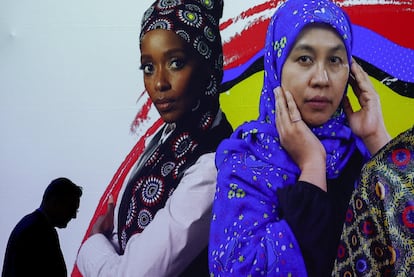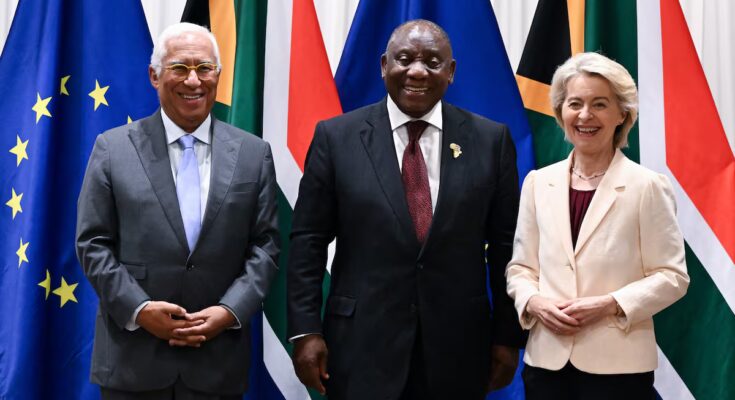The G-20, the forum bringing together the world’s major economies, plans to hold its annual summit this weekend in Johannesburg, where the South African presidency will seek to advance issues of concern to the Global South. The meeting, however, is shaken by the geopolitical earthquake of the American plan for Ukraine. European leaders and the president of Ukraine, Volodymyr Zelenskyj, have activated urgent consultations to plan a joint response to the plan configured by the White House without taking it into account. European Commission President Ursula von der Leyen has indicated that European leaders will hold a meeting on the sidelines of the summit this Saturday.
“We spoke with Zelensky. We discussed the current situation and we are clear that nothing should be decided on Ukraine without Ukraine,” Von der Leyen and António Costa, president of the European Council, said in a joint message. The Ukrainian president, for his part, also had a joint telephone conversation with the French president, the German chancellor and the British prime minister.
Two of the main leaders of the diplomatic struggle around Ukraine, Donald Trump and Vladimir Putin, will not be present at the Johannesburg summit, characterized by important absences – the leaders of China, Xi Jinping, and Argentina, Javier Milei, and the Mexican president, Claudia Sheinbaum will also be missing – which cloud the prospect of being able to reach significant commitments during the meeting. However, the participation of the main European leaders is expected.
The genesis of the Trump plan and the simultaneous absence of relevant leaders in Johannesburg emerge as an emblem of a world governed in an increasingly rigid way by dynamics of force and bilateral relations. Trump gave Zelenskyj a week to respond to the plan with a gesture that smacks of an ultimatum.
The G-20, a group that represents 87% of the world’s GDP and 62% of the population, is an organization without executive power, but has constituted, since the 2008 crisis, an important instrument of international coordination between the main countries in an increasingly interconnected world and with challenges that are unsolvable without transnational cooperation. Therefore, its loss of effectiveness is a worrying sign. Below are some of the keys to the summit beyond the Ukraine crisis.
Absences
The South African event will be the one with the highest number of absences since the group’s inception twenty years ago. It is, in fact, the first time that a president of the United States will be absent. Donald Trump justifies his absence by protesting against the alleged persecution of which the whites of South Africa are allegedly victims, in a crude manipulation of easily verifiable truths.
Trump has also decided that no other American representatives will attend the summit, which represents a significant diplomatic difficulty since the forum works by consensus and a joint statement seems complicated in these circumstances. It is therefore not a direct boycott against the G-20, of which the United States will assume the next rotating presidency, but it is a torpedo in the buoyancy of this summit.
Xi Jinping also decided to skip the appointment. He did not participate in the one in India, in 2023, as a sign of affront to New Delhi. This time his absence raises greater diplomatic concerns, as he could have gained prominence by filling the void left by the United States, but Xi probably did not want to be at a meeting without other important leaders and with a chaotic negotiation process. At least Beijing will be represented by its prime minister, Li Qiang.
As usual, Vladimir Putin will not attend, as the international arrest warrant against him would expose him to arrest. However, it is significant to note that this time he decided not to send his Foreign Minister, Sergei Lavrov, as on previous occasions, but rather a lower-ranking representative.
Adding to the list of absences are the Argentine president, Javier Milei, who faithfully follows the path laid out by his economic savior, the United States, and the president of Mexico, Claudia Sheinbaum, who follows the path of his sponsor, Andrés Manuel López Obrador, who was not traveling for reasons diplomatically difficult to understand. This landscape leaves room for maneuver for the EU and India to present themselves as more committed supporters of international cooperation.

Goals
The South African presidency has committed to prioritizing key goals for Africa and the Global South during a year of preparatory sessions for the summit. This will be the fourth consecutive summit to be held in the geopolitical south: Indonesia, India, Brazil, South Africa. The Presidency’s priorities are action to strengthen resilience and response to climate change-induced disasters; debt sustainability of low-income countries; mobilizing financial resources for a just energy transition and designing a framework for the sustainable and inclusive exploitation of critical minerals.
Of course the other members have different priorities. The EU, for example, is pushing hard to address the issue of China’s excess industrial production capacity, doped with huge state aid, producing a flood of goods into so many markets around the world, or the need for international trade based on rules and arbitral institutions.
Tensions
At a substantive level, friction occurred over a broad spectrum of issues. The usual tension remains between countries that want the G20 to adopt a position of clear political impetus for the energy transition – such as Brazil or South Africa – and those that resist – Russia or Saudi Arabia -.
Another area of tension concerns gender issues, concerning some civil rights. Certain resistances, which in the past remained in a more or less latent state, are now perceived as galvanized and unleashed by the second advent of Trump, which acts as a great accelerator of retrograde impulses.
On a formal level, tension hovers around the format of the summit’s final document. The South African presidency aspires, as is tradition, to a joint declaration, but the United States protests, arguing that tradition is consensus. The possibility of a G20 summit declaration, a diplomatic invention to issue a common document for the participants, is being studied. The alternative, which would represent a failure, would be a declaration by the South African presidency, perhaps signed by those who adhere to it. The South African government is working hard to avoid this scenario. Sources consulted by the Reuters agency claim that the negotiators have reached an agreement on a text, but without knowing its content or the way in which it would be presented by the leaders.



